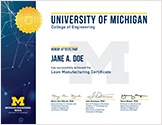PROFESSIONAL EDUCATION CERTIFICATES
Lean Manufacturing
Home » Professional Education » Lean Manufacturing
Key Information
Course Dates
Time Commitment
10 DaysMaster Certificate in Lean Manufacturing
$3400
To enroll in only Week 2 of Maize or Blue, please email [email protected].
Not ready to commit?
Subscribe for email updates on future offerings and get a program brochure.
LEAN MANUFACTURING
Submit info below and we’ll email you our Lean Manufacturing course brochure.
By submitting this form, you are consenting to receive marketing emails from Nexus. You may unsubscribe at any time.
By clicking 'Get Course Information' you are agreeing to receive emails from Nexus.
Improve quality, reduce lead times, and lower costs.
Through expert lectures, case studies, exercises, and simulations, Lean Manufacturing will equip you with the skills needed to enhance productivity and increase customer satisfaction. By implementing Lean principles and eliminating waste, you can improve your manufacturing process. Learn how to use Lean manufacturing tools, methods, and change management techniques and set your team on a path to success.
LEAN MANUFACTURING
Submit info below and we’ll email you our Lean Manufacturing course brochure.
By submitting this form, you are consenting to receive marketing emails from Nexus. You may unsubscribe at any time.
By clicking 'Get Course Information' you are agreeing to receive emails from Nexus.
LEARNING OBJECTIVES
- Know how the philosophy and core methods of Lean manufacturing apply to your business
- Value stream map the current state of your material and information flow through the value chain — understand where the added value is for the customer
- Identify waste and its root cause in the value stream
- Develop future state vision of your Lean systems by using kaizens (improvement events)
- Use the leadership skills needed to drive Lean initiatives
PROGRAM OVERVIEW
LAPTOP REQUIRED FOR IN-PERSON OFFERINGS
LEARNING SCHEDULE
Mon-Fri 8:30AM – 4:30PM ET
Complete the two-week course to earn your Certificate. Within two years, complete a third week (the five-day Week 2 course you have not yet taken—Maize or Blue) to earn the Master Certificate.
MASTER CERTIFICATE IN LEAN MANUFACTURING
Email ope[email protected] to register for only Week 2 of Maize or Blue.
$3400
WEEK 1: Lean Manufacturing Essentials
- Understand the Lean Manufacturing principles and benefits
- Understand continuous flow, pull, and standardized work
- Understand value versus waste and how to identify waste
- Participate in a hands-on simulation where you have opportunity to use the principles of Lean to improve flow
- Learn how to construct a current state value stream map and what data to collect for the value stream map
- Learn how to interpret the data and the current state to identify capacity constraints, bottlenecks, and waste
- Understand the role and function of “process boxes” and “data boxes” in a value stream map
- Learn the key factors to consider and the key questions to ask to develop a future state map from the current state
- Practice the above learnings through a team-based exercise to develop a current state and a future state map for a supplier company
- Understand the differences between a pull and a push system
- Understand different kinds of pull systems and their implementation details
- Understand how much inventory is necessary (number of kanbans) in a pull system and how to compute these numbers
- Understand EPEI (every product every interval) and the role of set-up reduction in pull system design
- Understand how to extend pull to purchased parts
- Practice concepts in case studies and simulation
- Learn how to see the “big picture” by constructing a PQ-chart (aka ABC analysis) for your product families
- Learn how to estimate equipment and labor requirements for a cell as well as allocating work among the operators assigned to the cell
- Learn how to compute and place standard WIP in a cell
- Practice the above learnings by designing with your team two cells: an assembly cell for laptops and a fabrication cell for a component
- Understand the history of Kaizen and be able to articulate the different types of Kaizen events
- Learn how to structure waste walks as a form of improvement event
- Learn how to formulate different Lean tools as a structured Kaizen event
- Learn how to plan, structure, and carry out a Value Stream Mapping Kaizen event
- Develop tips for improving the effectiveness of Kaizen event facilitation by focusing on team dynamics and personality profiles
- Understand the role of the facilitator in running Kaizen events and gain tips to improve the effectiveness of this role
- Learn and practice the three phases of conducting a Kaizen event: 1. Planning and Preparation, 2. Implementation, 3. Presentation, Celebration, and Follow-up
Week 2 MAIZE: Lean Methods & Implementation
- Understand key operational metrics (throughput, flow time, and WiP) and their drivers
- Understand how to conduct capacity analysis to identify and alleviate bottlenecks
- Understand the role of variability in reducing throughput and increasing WIP
- Learn how to link operational improvements to financials
- Practice concepts in case studies and simulation
- Understand what is meant by “Lean Six Sigma”
- Achieve a high level understanding of the Six Sigma methodology
- Apply Six Sigma in a case study
- Understand the link between variation and flow
- Learn how to define Six Sigma projects from a value stream perspective
- Learn how to operationalize the Lean Six Sigma roadmap
- Practice applying the Process Maturity Matrix – Lean Six Sigma Roadmap to prescribe an approach to continuous improvement in a number of different situations
- Learn the pathway from the current state to Lean Six Sigma and beyond
- Learn the critical relationship between the layout of a facility and the current/future state value stream
- Learn how to use spaghetti charting and compute parts-travel to assess/improve a layout
- Practice the above learnings by working with your team to develop and assess the layout of a manufacturing plant
- Learn the role and impact of long-term facility planning and expansion considerations
- Learn the relevance and criticality of tying Lean systems to your organization’s strategic plan
- Learn how to develop and execute a basic Hoshin Kanri (i.e., X-Matrix) to create a Lean systems strategic plan
- Understand how to develop a charter for a Lean systems implementation committee based on your organization’s infrastructure
- Learn about various Lean assessment models to evaluate the maturity of a Lean system in your organization
- Practice the above learnings via team-based exercises and develop sample models that can be applied in your organization
Week 2 Blue: COMPLEMENTARY LEAN TOOLS & PRACTICE
- Learn a tool to rate an operation’s Lean state based on a quick tour
- Understand how to rate Lean through visual clues
- Learn how visual management motivates people and teams
- Understand the relationship between Lean progress and cost savings in an operation
- Learn how complexity and variability reduction relate to Lean improvement
Zingerman’s Mail Order Walk-Thru
610 Phoenix Dr, Ann Arbor, MI 48108
- Learn the difference between standardization versus standards
- Learn the background/history of standardized work
- Internalize the steps to implementing standardized work
- Demonstrate the application of the steps (defining product families, calculating takt time, performing standard work analysis, and developing standard work documents) in an academic case
- Review the application of the standard work process in an industry case
- Practice implementing the standard work process in a simulation
- Learn how to train using standardize work leveraging the Job Instruction method
- Learn how to use the simplify-eliminate-combine principle to reduce/eliminate material handling waste
- Learn the role and impact of plan-for-every-part (PFEP) and lineside-back design
- Learn the basic structure and operation of milk-run systems (fixed interval, variable quantity deliveries) and call systems (variable interval, fixed quantity deliveries) used in Lean plants.
- Practice the above learnings by designing a milk-run system and a call system with your team for a manufacturing plant with known workstation locations and layout
- Understand the role of change management in a successful Lean implementation
- Understand and gain the capability to implement change management using a structured (7-step) Lean change model
- Apply the Lean change model in a simulation where you undertake Lean change in a complex, high-pressure environment
- Apply the Lean change model to brainstorm ways to accelerate your company’s Lean transformation
WHO SHOULD ATTEND
This program will benefit any manufacturing, production, purchasing, and supply chain professional. Over 9,000 participants have received a Lean Manufacturing Certificate. Program alumni represent a variety of industry sectors:
- Aerospace
- Automotive
- Computer
- Defense
- Furniture
- Glass
- Government
- Logistics
- Plastics
- Semiconductors
- Shipbuilding
- Steel
- Telecom
- Tire
- Tool and Die
INSTRUCTIONAL TEAM

Izak Duenyas, PhD
- Lead Faculty
- Associate Dean for Executive Programs, Herrick Professor of Business, Ross School of Business
What's Next?
CERTIFICATE
Organizational Design Thinking
Inspire organizational change with creative problem solving and strategic action.




